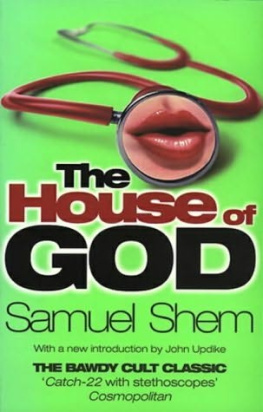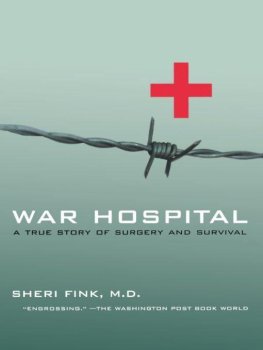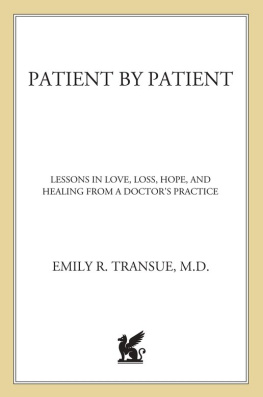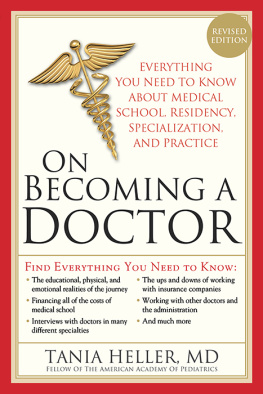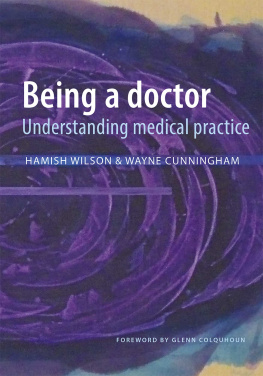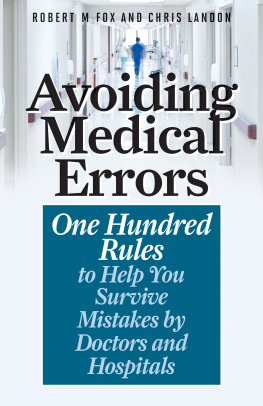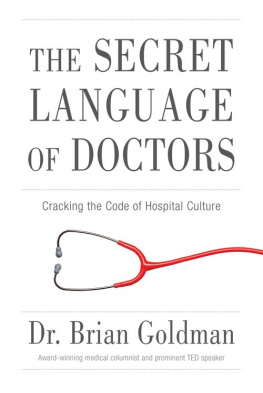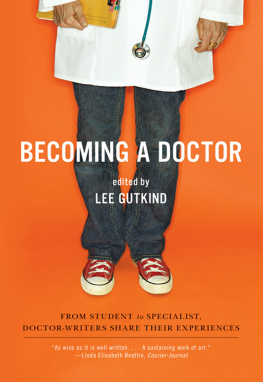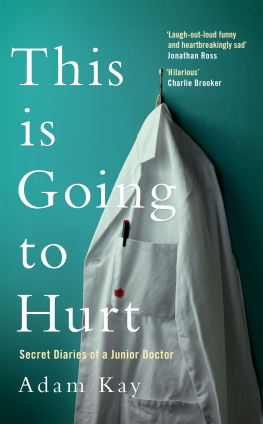The House of God
by SAMUEL SHEM
The author wishes to express appreciation for permission toquote from the following: "The Man with the Blue Guitar" by WallaceStevens from The Collected Poems of Wallace Stevens 1971 byAlfred A. Knopf, Inc. Lines from "Let the Mermaids Flirt with Me" areby Mississippi John Hurt, copyright by Wynwood Music.
To J and Ben
We shall forget by day, except
The moments when we choose to play
The imagined pine, the imagined jay.
Wallace Stevens The Man with theBlue Guitar
INTRODUCTION TO DELL'S TENTH ANNIVERSARY EDITION OF THE HOUSE OF GOD
It's hard to believe that The House of God is now ten.What a life our ten-year-old has led! The author has found himself inthe curious position of chasing after the youngster, traveling allacross the globe, listening and speaking. Inevitably, three mainquestions are asked:
A) "Was it really like that?" Yes, it was. In fact, the departuresfrom reality were not what you'd think. For instance, readers assumethat the "Black Crow Award," given for the most postmortems, was aninvention of the author's sick mind. Alas, every word is true. Worsestill is the death of the "Man with Agonal Respirations," and myattempt to report back as accurately as possible from the front line onour modern way of dying. Read Tolstoy's War and Peacethe endof Book Twelve, "The Death of Prince Andrew"for a report from the morehumane past. No, friends, I did not coin the word gomer, nor did Iinvent the cruelty toward those with that label. Neither did I createthe sexist way that women were treated in hospitals at that time. Apromising change since then has been the numerical parity of women inmedicine. Yet I hear that in many ways, medical training may now beeven worse.
B) "How can we change it?" Two ways: firstly, on an individuallevel, by learning how to stay human in the system; secondly, on acollective level, by taking action. The latter is the easier, becausethe challenges are clear. For instance, the brutal on-call schedule mustbe abolished. We need more interns per program per year. The onlypossible argument against this is that there's not enough money. Towhich I say: Scrap a single nuclear missile; you'll have all theinterns you'll ever need. Is it clear how we in medicine reflect thepriorities of the culture?
C) "How can we stay human throughout it?" The "laws" of TheHouse of God were a desperate attempt to create a saving order inthe chaos of the savagery, a kind of laundry-list of individualsurvival. But, however accurate some of them may be, ten years laterthey seem childish. Law Number Four "The patient is the one with thedisease"seems particularly abhorrent, a symptom of a disease thatinsists: "I, the doctor, am different from you, the patient." I wrotethe book because I could not not write it; I had to reportback on what still seems the worst year of my life. During myown decade of recovery, as I've listened to your responses, I'veevolved a series of suggestions on "How to Stay Human":
) Live. This is often overlooked. There is no otherpurpose than to live, and to live is to relate. In isolation there maybe survival, but only in relationship is there life. Medicine is partof living, not vice versa. Lean into life, not away. Takecare of the physical, emotional, and spiritual health. Attend to diet,sleep, and exercise; moderate alcohol, and use no cigarettes oraddictive drugs. Don't deny illnessgo to a doctor P.R.N.
) Learn the science of medicine. We must learn the scienceto practice the art. People will listen to us only if we are competent.Our competence makes room for the growth of our compassion, ourhumaneness.
) Choose teachers and models who are human. Given ourcompetitive breeding, we tend to migrate to those who are smart. Thepath to compassion is different. Knowledge can be a barrier todiscovery. Compassionate souls in the medical hierarchy are like rarejewels. When you find one, hang on for dear life!
) Be with the patients. This is at the heart of TheHouse of God, and nothing since has changed it.
) Choose the location of your training with awareness of thelife qualities. You may well wind up living there.
) Choose a training program for its humaneness. Even ifyou're an academic, choose a program that's user-friendly. The on-callschedule will determine your mental state and whether your marriage orrelationship survives. Most programs are good enough to learn yourtrade, yet the wrong program can have profound and terrible effects onyour life.
) During training, open up to the whole spectrum of the healingarts. Many of the holistic methods are as useful as traditionalones. For example, Alcoholics Anonymous is the treatment of choice forthat disease, and we doctors must learn how to prescribe it.
) Live your understanding, no matter what. If we sense aninjusticelike The Black Crowwe must speak up, no matter what. This iswhy we have to be competentso people will listen. In the face of evil,the worst thing is silence. Speaking up has its drawbacksbelieve me,the messenger can get blamed for the news. It's not only that speakingup is necessary to call attention to the wrongs in the world, speakingup is essential for your survival as a human being.
) Be open to the forces of compassion in the world. They arethere. If you start to show compassion, like-minded others will appear.Life itself will make the appointment for you, and others will show upto meet you.
) Act locally, think globally. The cycle of violencebegins in the inner world and extends to the outer. Froman earlyage we are taught to be competitive, and then, when we see aggressionout in the world, we act surprised. The comparative, competitive mindis certain to become aggressive. If we are treated brutally, we tend totreat others the same way. And so, if we find ourselves in a cycle ofbrutalitywithin our hospitals or withoutwe must break it. Not onlyshould we never cooperate with the forces of destruction, but we shouldtry to turn them into the forces of creation. To turn cruelty tocompassion is a great alchemy of life. You see, the world is so finelybalanced that small actions can have tremendous effectsone person canmake a difference.
Our ten-year-old did, and is continuing to do so.
To all, my gratitude.
Samuel Shem, M.D., Ph.D. October 15,
I. FRANCE
Life's like a penis:
When it's soft you can't beat it;
When it's hard you get screwed.
The Fat Man,
Medical Resident in the House of God
1
Except for her sunglasses, Berry is naked. Even now, on vacation inFrance with my internship year barely warm in its grave, I can't seeher bodily imperfections. I love her breasts, the way they change whenshe lies flat, on her stomach, on her back, and then when she stands,and walks. And dances. Oh, how I love her breasts when she dances.Cooper's ligaments suspend the breasts. Cooper's Droopers, if theystretch. And her pubis, symphasis pubis, the bone under theskin being the real force shaping her Mound of Venus. She has sparseblack hair. In the sun, she sweats, the glisten making her tan moreerotic. In spite of my medical eyes, in spite of having just spent ayear among diseased bodies, it is all I can do to sit calmlyand record. The day feels smooth, warm, pebbled with the nostalgia of asigh. It is so still that a match flame stands upright, invisible inthe clear hot air. The green of the grass, the lime-white walls of ourrented farmhouse, the orange stucco roof edging the August blue skyitis all too perfect for this world. There is no need to think. There istime for all things. There is no result, there is only process. Berryis trying to teach me to love as once I did love, before lie deadeningby the year.

